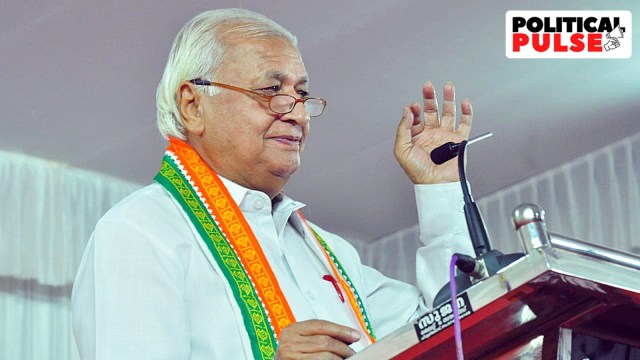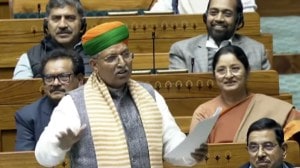After Punjab, TN, Kerala moves SC against Governor: ‘Complete subversion of Constitution’
Earlier, TN accused Governor of “positioning himself as a political rival to the elected govt”; after Punjab said it would move SC too, Governor clears two pending Bills, says looking at others
 The Kerala government has claimed inaction on the part of Governor Arif Mohammed Khan in relation to eight Bills passed by the Assembly, and said many of these involve immense public interest. (Facebook/Arif Mohammed Khan)
The Kerala government has claimed inaction on the part of Governor Arif Mohammed Khan in relation to eight Bills passed by the Assembly, and said many of these involve immense public interest. (Facebook/Arif Mohammed Khan) Kerala became the third state, after Tamil Nadu and Punjab, to move the Supreme Court Thursday against its Governor over pending Bills and other issues.
The Kerala government has claimed inaction on the part of Governor Arif Mohammed Khan in relation to eight Bills passed by the Assembly, and said many of these involve immense public interest.
“Of these, three Bills have remained pending with the Governor for more than two years, and three more in excess of a full year. The conduct of the Governor… threatens to defeat and subvert the very fundamentals and basic foundations of our Constitution, including the rule of law and democratic good governance, apart from defeating the rights of the people of the state to the welfare measures sought to be implemented through the Bills,” the Kerala government’s plea says.
It adds that under Article 200 of the Constitution, it is the solemn duty of the Governor to “declare either that he assents to the Bill or that he withholds assent therefrom or that he reserves the Bill for the consideration of the President”. “The Governor appears to be of the view that granting assent or otherwise dealing with Bills is a matter entrusted to him in his absolute discretion… This is a complete subversion of the Constitution,” the Kerala government has said.
Kerala Law Minister P Rajeev said that even the Supreme Court had said that the Bills passed by state Assemblies should not be withheld indefinitely, and said Khan was “not discharging his constitutional duties”.
Khan, who has had a running battle with the LDF government in the state, has contended that he has withheld assent to some Bills as his queries regarding them were yet to be addressed.
Like Kerala and Khan, the Tamil Nadu and Punjab governments have also had several disputes with their Governors R N Ravi and Banwarilal Purohit, respectively.
In its plea, the DMK government in Tamil Nadu has said that Governor Ravi has “positioned himself as a political rival to the legitimately elected” Tamil Nadu regime, and that a Governor’s actions should reflect “the satisfaction of the Council of Ministers”.
A constitutional authority is “consistently acting in an unconstitutional manner, impeding and obstructing” the functioning of the state government “for extraneous reasons”, the state’s plea says, adding that the delays in legislation and crucial appointments were leading to “a constitutional deadlock”.
The Tamil Nadu petition also refers to Article 200 apart from 163, to say that the Governor has limited scope for action once a Bill is passed by an Assembly, and that “any delay or refusal” effectively disrupts parliamentary democracy.
It mentions 12 Bills as pending with Ravi, apart from the delay in approving the transfer of investigation to the CBI in cases involving high-profile politicians. The oldest legislation pending with the Governor dates back to 2020 and include a Bill to confer on the government the power of inspection and inquiry instead of the Chancellor (Governor) and another Bill to include a government nominee in the panel for selection of some vice-chancellors, says the government.
Many of the pending Bills, in fact, similarly involve a shift in administrative authority from the governor to the state government.
The DMK government’s petition says that numerous universities find themselves in “administrative uncertainty”, and asks the Court to declare the delay by the Governor “unconstitutional, illegal, arbitrary, unreasonable, and a malicious exercise of power”. It says the Court should “issue directives” to Ravi to act on all pending Bills, files and orders within a specified time frame, and also “provide guidelines for the Governor”.
In the case of Punjab, recently three money Bills proposed by the state’s Aam Aadmi Party government for a special session of the Assembly were withheld assent by Governor Purohit. This led to adjournment of the special Assembly session. The AAP government then said it will move the top court.
After this, Purohit wrote to Chief Minister Bhagwant Singh Mann saying he would examine the pending Bills and convey his decision “on each and every Bill separately in the coming days”. “I have already given assent to 22 Bills out of 27 passed by Punjab Vidhan Sabha. Rest of the five Bills passed as well as three money Bills sent by the government recently are under my consideration,” he said. On Tuesday, he cleared two of the money Bills.
Apart from a third money Bill, Punjab Fiscal Responsibility and Budget Management (Amendment) Bill, the legislation yet to get the Governor’s assent include: the Punjab Police (Amendment) Bill, 2023, for an independent mechanism for selection of DGP; Sikh Gurdwaras (Amendment) Bill, 2023, to end “undue” control of a particular family (read the Badals) over the rights to telecast Gurbani from the Golden Temple; Punjab University Laws (Amendment) Bill, to vest the powers of chancellors in state universities with the CM; and Punjab Affiliated Colleges (Security of Service) Amendment Bill, 2023, to streamline the working of the Education Tribunal.
- 01
- 02
- 03
- 04
- 05































